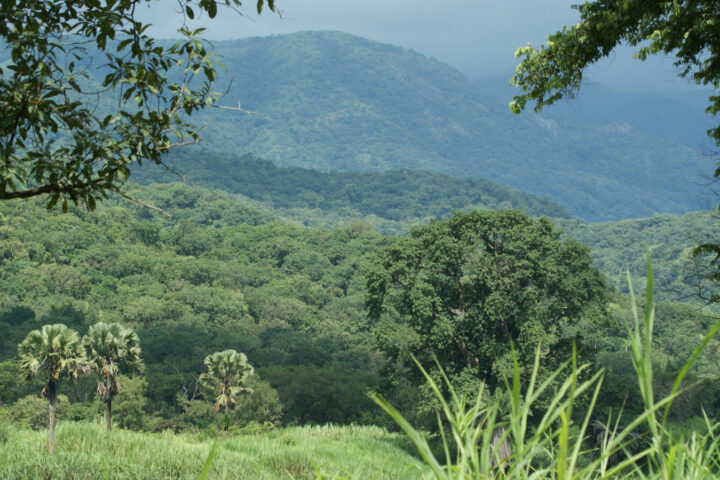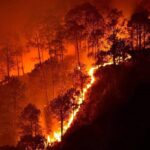A new study reveals irrefutable evidence that Forest Stewardship Council® (FSC®) certified forests in Gabon and the Republic of Congo harbor a greater abundance of large mammals and critically endangered species, such as gorillas and elephants, compared to non-FSC certified forests. The research was conducted by Utrecht University with the support of WWF and the Wildlife Conservation Society (WCS), and the study was published in Nature on April 10, 2024. It highlights the effectiveness of measures implemented in FSC-certified forest concessions to protect wildlife.
Key Findings: FSC Certification Protects Large Mammals
By meticulously counting individual animals and strategically positioning camera traps, Joeri Zwerts confirmed in his research that certified concessions harbor notably larger populations of large mammals – 2.7 times more for mammals over 100 kg, such as gorillas and forest elephants, and 2.5 times more for mammals weighing 30 to 100 kg, such as leopards and chimpanzees – compared to non-FSC certified areas. The observed encounter rates for large mammals in FSC-certified forests were comparable to data published in recently monitored protected areas in the Congo Basin region.
Additionally, the number of smaller mammals observed was similar in both FSC-certified and non-certified concessions. Large mammals are generally the first species to suffer from poaching and hunting and to disappear, suggesting a decrease in biodiversity attributable to unsustainable forestry practices in non-FSC certified forests. The effects were similar in the Republic of Congo and Gabon.
Similar Post
Evident Link Between Hunting and Biodiversity Loss
The study emphasizes the central role of hunting in biodiversity loss, highlighting the rarity of hunting signs and the increase in wildlife traces in certified concessions. Proactive measures taken by certified forestry entities – such as blocking old forest paths, establishing checkpoints, and supporting alternative protein sources for local populations – have significantly curbed illegal hunting. As a result, communities living around FSC-certified concessions consume less bushmeat, reducing the risk of wildlife disease transmission.
Beyond wildlife conservation, the study highlights the broader positive impact of FSC certification. The preservation of large mammals positively influences seed dispersal, nutrient cycling, and forest carbon storage. In a 2019 study published in Nature Geoscience, researchers estimated a potential 7% reduction in carbon storage in tropical forests if elephants were to disappear.
Responsible Forest Management is Key to Preserving Biodiversity
The study shows how sustainable forestry practices can contribute to the conservation of large mammal populations and the protection of existing tropical forests. To a greater extent, local communities derive economic and social value from certified forestry practices, as opposed to activities associated with forest clearing such as palm oil or soybean cultivation.
According to Joeri Zwerts, this study – the first to compare so many different forest areas simultaneously – ” It was a large and ambitious project that took five years and involved hundreds of local employees. It was hard work, but the knowledge we gained will make an important contribution to the protection of animals in tropical forests.”
Kim Carstensen, General Director of FSC International, affirmed: “Utrecht University’s study reinforces FSC’s core principles and our commitment to responsible forest management. This research affirms the vital role of FSC certification in fostering diverse ecosystems and protecting endangered species in tropical forests, while benefiting both local communities and the environment.”
For Dr. Peter Alele, FSC Regional Director for Africa, “The study conducted in the Congo Basin, a vital green lung for our planet, highlights the essential role of FSC certification in the responsible and sustainable management of natural resources. The study’s conclusions irrefutably demonstrate that FSC solutions enable governments to achieve national and international deforestation and biodiversity goals while improving the quality of life for local communities. This win-win approach offers a clear path to a sustainable future for the Congo Basin and beyond.”
Methodology: Rigorous Monitoring Reveals Uncontestable Evidence
Led by Joeri Zwerts and his team, the study published in the scientific journal Nature used 474 camera traps in 14 forest concessions – seven FSC-certified and seven non-FSC-certified – in the Congo Basin. Over a three to four-year fieldwork period (two to three months monitoring per concession), these traps took 1.3 million images, capturing about 55 mammal species, including leopards and gorillas, as well as various threatened species.
Fiona Maisels, co-author of the article and scientific researcher working with WCS, emphasized that “Tropical ecologists have known for some time that FSC certification is helpful for maintaining large-bodied mammal populations, based on studies that compare a single protected area to adjacent concessions.” However, she added, this is the first time a set of certified and non-certified management concessions have been included in a carefully designed study covering a vast geographic area. The results are clear: large, threatened animals (such as forest elephants and great apes) fare better in FSC-certified forests.
Peter Alele, PhD, FSC’s regional director for Africa, stated that the importance of FSC certification in the responsible management of the Congo Basin’s natural resources is well-established. “The study in the Congo Basin, a vital green lung of our planet, shines a spotlight on the critical role of FSC certification in responsible and sustainable natural resource management. Its findings provide compelling evidence that FSC solutions empower governments to achieve national and international deforestation and biodiversity goals, all while fostering improved livelihoods for local communities. ,” he said. Forest concessions represent more than half of the remaining forest areas in the two countries studied, with 67% in Gabon and 61% in Congo.

















